Earlier today, Charles Franklin (Director of the Marquette Law School Poll, co-founder of Pollster.com, proprietor of PollsAndVotes.com, etc.) posted the following:
Clearly, since Trump entered the race, his numbers have greatly improved while Walker's and Rubio's have declined markedly. I found that counter-intuitive for a moment, until it dawned on me that nearly all of the candidates who showed little change were those who had little support to begin with. Obviously, if one is polling at 2%, it would be pretty difficult to lose more than 2 percentage points. If a candidate shows a sudden surge in the numbers, the most probable losers would be those with a decent amount of support available to lose.
Walker and Rubio fit that bill.
Another GOP candidate that had a pretty decent base of support before Trump joined the fray is Jeb Bush. Jeb announced mid-June and subsequently gained publicity for some eye-popping fundraising numbers. As such, it isn't all that shocking that he saw his support rise during and despite the Trump boomlet.
But is it all as simple as Trump is hurting the other GOP front-runners excepting Bush, who avoided the decline during a honeymoon phase? I am skeptical.
Since Charles was gracious enough to tell everyone which surveys he was using for his graph, I was able to go back to the surveys he used and look at some other numbers. The surveys he used were Monmouth, Fox Opinion Dynamics, and CNN/ORC International. I found the releases for the most recent iteration of each (linked below), each of which helpfully had earlier results included in them. The data from these made me even more skeptical.
In each of the following charts, the most recent iteration of a survey is to the left. For each survey, only the most recent was conducted after Trump announced. These are for the three candidates I would have called the frontrunners a month ago.
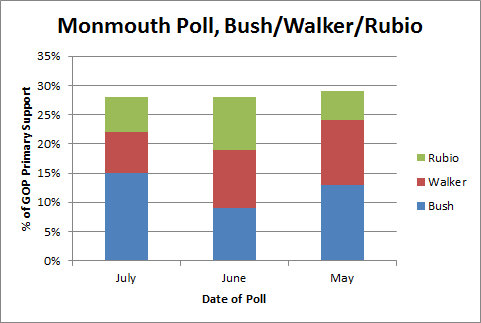
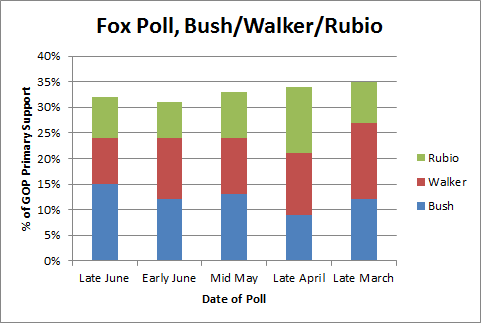
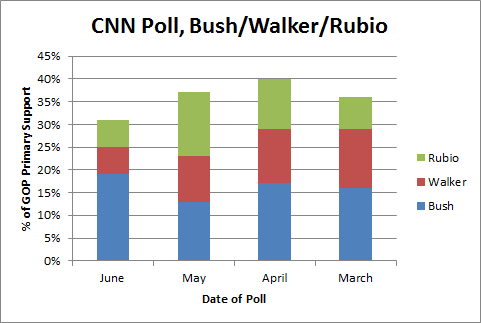
In each, the overall support for the triumvirate has been fairly steady. Within the Monmouth poll, the aggregate has varied by all of one percentage point. In the Fox poll, the spread is four percentage points with the most recent being three off of the maximum. In the CNN poll, one might get the impression that the group fell off in the most recent survey, but concurrent with their collective decline in the late June survey was growth in the combined "none of the above" / "no opinion" cohorts of eight percentage points in May. I believe that these three have been stealing share back and forth from each other for the past few months, and The Donald has not impacted them much, if at all.
The following charts compare Trump with all candidates other than Rubio, Walker, and Bush. Notice again how the aggregate totals remain fairly constant, especially when one keeps in mind the margin of error.
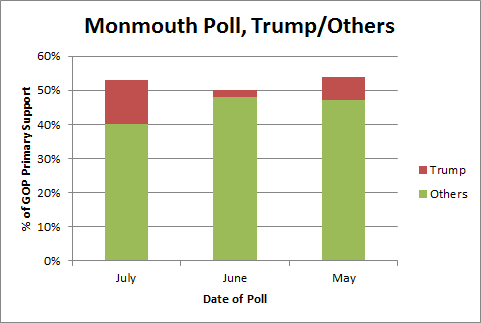
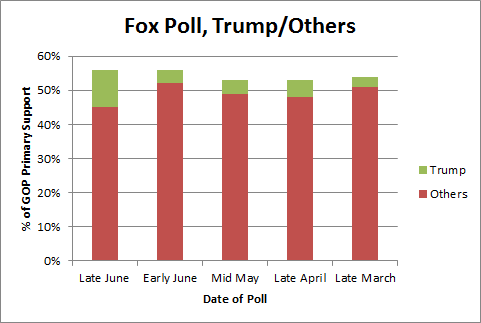
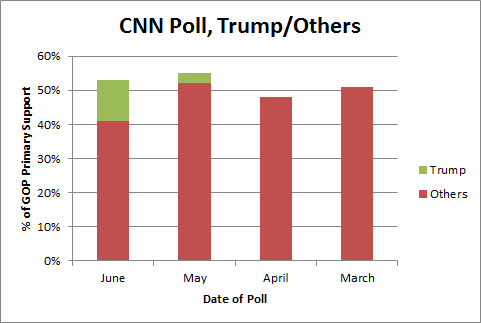
Trump is not hurting the presumed front runners. Instead, he's been sucking some of the air away from the candidates that Republican primary voters have been considering as alternatives to the main three; Christie, Carson, Huckabee, and Cruz hit the most. At least, that's the way it appears to me.
The .pdf files for the surveys are here: CNN/ORC, Fox Opinion Dynamics, Monmouth
Edited to add: If one goes by the Monmouth and Fox polls, you could also say that Paul isn't being impacted by Trump one iota. His numbers have been remarkably steady in each of their surveys. CNN, however, has shown him slipping a bit.





